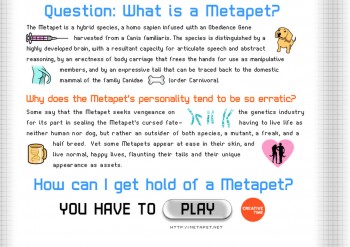Natalie Bookchin’s Metapet is a game almost designed to make you stop playing, or at least to stop playing “properly”. You take the role of the corporate manager of a bio-engineered, “transgenic virtual pet.” “Your challenge,” says the game site, is to “discover the right balance between a firm hand and a gentle coax without ever losing sight of the bottom line.” Played according to the apparent rules, the game proceeds by the manager encouraging—or, really, disciplining—the Metapet, in order to make its activity as profitable as possible (you feed it, let it rest, give it drugs, perform genetic tests on it, and so on). Basically, if you play by the rules and try to make money, you will end up torturing your Metapet. As Bookchin says:
“Playing according to the rules will lead to the most boring of outcomes. Players will earn money, but who cares? Money makes you a “winner” but…you can’t do anything with the money, and the game will soon become pretty dull. On the other hand, playing poorly will lead to some of the more interesting game elements. Your Metapet will become a lot more colorful and rebellious, artists’ mini games (in which I had other artists design simple little games about biotechnology) will show up, and your pet starts sending messages back and forth to other Metapets. “
In Metapet, participation – play – is in the first instance presented as completely consistent with the demands of global capitalism. It’s only when and if some other experiential framework is brought to bear or asserts itself that the behaviors that the game seems to require begin to appear troublesome; so much so that one response might be simply to stop playing. This is to suggest that there might be a distance, or a crucial lack of fit, between the context of the participatory, mediated event and other horizons of experience (experience is not a simple continuum).
Bookchin seems to have Situationist leanings, and Metapet might be the first self-detourning online game.
—Frazer Ward, Excerpted from “New Media Public Sphere and Experience” 2007
Metapet
online game (with Jin Lee)
2002


Screenshot from Metapet